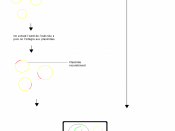Student's name: Jameel Sahadath Students' I.D. #: 810000068
Student's name: Luke Benjamin Students' I.D. #:811004036
Student Faculty: Science and Technology
Semester: 2
Academic Year: 2013/2014
Course Code: FOUN 1105 Option C
Course Title: Scientific and Technical Writing
Tutor's name: Mrs. Jannine T. Horsford
Tutorial Day and Time: Monday 2 pm - 3pm
Group Coursework Assignment: Literature Review -"The Ethical Implications of Genetically Modified Seeds"
Date of Submission: 10th March, 2014.
"The Ethical Implications of Genetically Modified Seeds"
Genetically Modified Seeds are produced from organisms and plants that have modified recombinant Deoxyribonucleic Acid (DNA) technologies. Umaharan (2014) and Dr. Elibok (2014) define it as a product of genetic engineering. These crops are a result of experimental methods done in hopes of equipping these natural seeds with specific traits that would account for increased crop yield, crop quality, herbicide, and insect and disease resistance among other aspects of agricultural industry. GM maize, in particular, was due to the commercial success of GM soybeans in 1996 which was created to resist synthetic herbicide which plagued the crop industry.
Currently mass produced as of 2011 in the US and Canada, GM maize has been noted for its uses in the food, chemical and biofuel industries. However, several ethical issues and the merit of GM seeds have caused controversy in relation to human, animal health and the environment.
An ongoing debate on human health between producers and consumers of genetically modified seeds occurs continuously. Umaharan (2014), explains that genetically modified seeds will reap fruitful results and benefit mankind by increasing crop yield, improving the quality and quantity of the food, thus eradicating global food shortage. On the contrary, negative consequences such as new diseases, allergens and toxins will gravely impact human health due to faulty misuse. The Open Nutraceuticals Journal (2011) emphasizes the undue advantages...
![In an effort to reduce corn stem-borer infestations, corporate and public researchers partner to develop local [transgenic] Bt (Bacillus thuringiensis) corn varieties suitable for Kenya.](https://s.writework.com/uploads/10/102015/effort-reduce-corn-stem-borer-infestations-corporate-and-pub-thumb.jpg)

